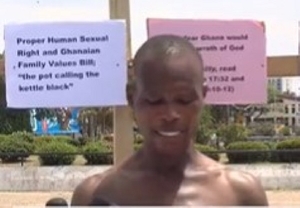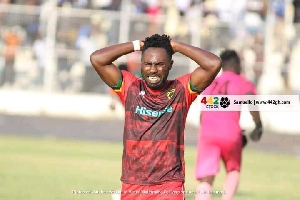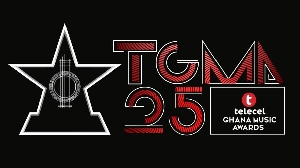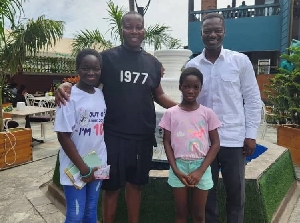Opinions of Wednesday, 26 November 2008
Columnist: Pryce, Daniel K.
Election 2008 Could Define President Kufuor’s Legacy!
A November 17, 2008, Ghana News Agency (GNA) news report that appeared on www.ghanaweb.com, titled “Kufuor assures of peaceful elections,” was not only vital and opportune, but was irrefutably the most important evocation, or explication, so far of what President Kufuor’s role will be in Election 2008. That a tranquil superintendence of Election 2008 will largely delineate Mr. Kufuor’s legacy is a veritable understatement. Ghana’s Fourth-Republican self-government, although replete with challenges ? from minor irregularities at the polls in the preceding four presidential elections to mistakes in governance by both John Kufuor and Jerry Rawlings ? has been hailed a success at home and overseas, primarily because those entrusted with Ghana’s Constitution have performed yeoman service in maintaining the rule of law and freedom of expression, just two of the inerrant and lasting bequests of a democratic culture. And regarding the former, both Jerry Rawlings and John Kufuor deserve unequivocal credit.
Speaking for President Kufuor at a recent church service held in Kumasi, Madam Patricia Appiagyei, the metropolitan chief executive of the afore-named city, declared the president’s irreproachable yearning to “do everything possible to ensure peaceful elections in December. [In addition, the president reminded Ghanaians that] the whole world, especially adherents of democracy, was looking up to Ghana to conduct peaceful polls in the wake of the political cris[es] that had afflicted most countries on the African continent” (GNA, 2008). That John Kufuor is committed to a peaceful Election 2008, that John Kufuor has publicly stated such, that John Kufuor is willing to see deployed the full array of the nation’s security forces to avert trouble at the polls is both expected and necessary.
To bolster John Kufuor’s stance, the European Union Election Observation Mission (EU EOM), at the invitation of Ghana’s Electoral Commission (EC), had on November 10, 2008, “dispatched 24 long-term electoral observers to the 10 regions” (GNA, 2008). Emphasizing the enormity of the impending assignment, the leader of the provisional EU EOM team, Mr. Nickolay Mladenov, would remind Ghanaians that “30 more short-term observers would be dispatched to the regions” (GNA, 2008), shortly before the elections are held. No one can deny the salience of such a team of observers, but taking into consideration Ghana’s electoral feats in the last four presidential elections, this foreign team should merely serve to complement what Ghana’s EC officials are already good at: the capacity to conduct free and fair elections.
Although foreign groups, mainly from donor countries, have had the privilege of observing and monitoring Ghana’s previous four presidential elections in the modern era, Ghanaians do not necessarily need such groups, in order to carry out a free and fair Election 2008. With an EC that has been in place for close to two decades, the finer elements necessary for holding a peaceful and transparent election should have been mastered by now. While I do not advocate the denial of visas to members of any other foreign group ? apart from EU EOM ? interested in monitoring this pivotal election, I pray that the presence of any such additional group will be no more than a mere formality: it should simply confirm what Ghanaians would have done on their own: the holding of a free and fair national election. After all, welcoming foreign observers could only imply that those in power readily embrace electoral transparency. Moreover, positive post-election statements from these observers are crucial for any procurement of needed funds from donor countries and Western powers for the continuance of our rather slothful fight against poverty and deprivation.
Perhaps, a most important step that the EC and the various political parties had taken in tandem was ensuring that the registration of voters had few flaws: double registrations and inflated registers had been exposed and corrected, where discovered. And on November 18, 2008, EC officials dutifully notified the Ghanaian public that one-half of one million invalid names had been jettisoned from the Voters’ Register (The Chronicle, 2008), a very positive development indeed. I also hope that the EC by now has debarred, at least until after Election 2008, any party official or EC employee caught attempting to inflate voter registers. Besides, with voter registrations concluded nationwide, total register figures are now public knowledge ? this process should help the various parties reconcile registration totals with actual votes cast on December 7, 2008.
To further buttress the openness of the election, all participating parties’ representatives must be granted full access by the EC to vote-counting at all polling stations, more so in the strongholds of “adversaries.” The absence of this kind of transparency had in the past provided political parties the ammunition to question the veracity of election results. And once votes from each polling station are counted and each party’s representative becomes a signatory to the declared results, the information must be transmitted instantaneously to the EC’s headquarters in Accra for further collation. If full transparency is allowed at each polling station, no persons or party zealots will have cause to question the reliability of the electoral process, more so the results of Election 2008. Foreign observers must act in an exemplary manner by taking a neutral position at all times; they should be quick to divulge to the EC for full investigation any reports of voter intimidation or vote-rigging.
To underscore the role of Ghana’s security agencies before, during and after Election 2008, Mr. Christian Owusu-Pare, the EC’s acting Director of Public Affairs, recently assured Ghanaians that “very look-alike photographs in the Voters’ Register would soon be referred to the Bureau of National Investigations” (GNA, 2008), to expose double registrations and bring the perpetrators to justice. Furthermore, Ghana’s Interior Minister, Dr. Kwame Addo-Kufuor, was reported to have asked the Inspector-General of Police to make sure that only police officers with “name tags and service numbers for easy identification” (GNA, 2008) are allowed at the various polling stations, for obvious reasons. Dr. Addo-Kufuor has further assured Ghanaians that, in order to avoid the intimidation of voters and likely rigging of votes, all polling stations and EC offices will receive adequate protection during Election 2008. Our security agents must also make sure that they do not permit unscrupulous party aficionados to illegally stuff ballot boxes at any time before or after votes are cast. All uniformed personnel ought to do the preceding to both uphold the integrity of the election and ensure that there is tranquility after the last ballot is cast at each polling station.
There is something magnanimous about the Ghanaian spirit, an enigmatic propensity for tolerance and peaceableness that makes mockery of the divisiveness, pugnacity and lawlessness pervasive in some neighboring countries. If Ghanaians are innately fearful of armed conflict and death, as some would argue, then that is really a good thing, for this primordial disposition, if there really is one, has helped in the preservation of our society, even while other nations, such as Liberia and Sierra Leone, have not been so fortunate. The nobility and forbearance of the Ghanaian should not be taken for granted, however, for there is a limit to everything, as the saying goes. In today’s politically charged atmosphere ? Ghanaian citizens have become more adept at the democratic process ? the notion of bona fide, or implied, threats by any person or group to rig Election 2008 may result in untold hardships for many citizens, especially the defenseless and poor.
I implore all Ghanaians to accept the results of Election 2008 in good faith, once the EC declares the final tally, provided the steps put in place now to avoid malfeasance are properly executed during the actual election. This pivotal national election will, one way or another, define President Kufuor’s legacy, and I believe that the sitting president is taking this responsibility very, very seriously. It is up to all Ghanaians ? voters, police officers, soldiers, EC officials, bureaucrats, ministers of state ? to assist President Kufuor make this transition a smooth and memorable one, irrespective of who wins the 2008 presidential election. Even after Election 2008 is over and the last ballot is counted and the results are collated and a new president-elect is announced, nothing will matter more than for every life to be accounted for and every limb to remain intact. It is only then that we can praise ourselves and jointly declare Election 2008 a success.
The writer, Daniel K. Pryce, holds a master’s degree in public administration from George Mason University, U.S.A. He is a member of the national honor society for public affairs and administration in the U.S.A. He can be reached at dpryce@cox.net.












